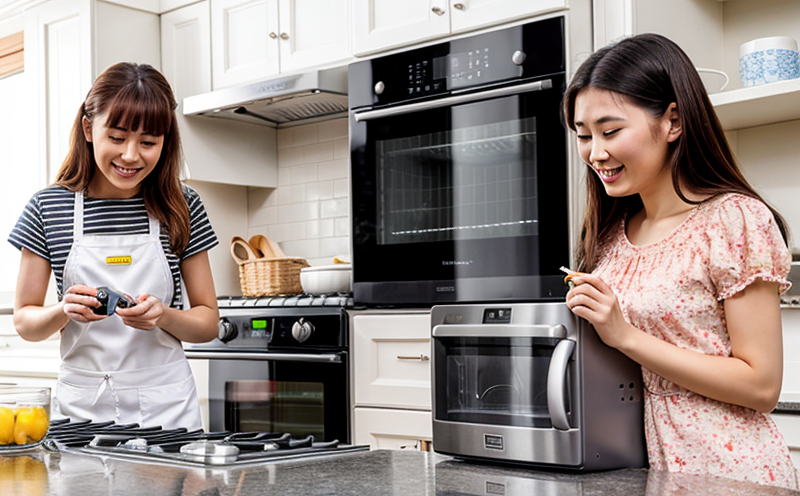ASTM F2607 Performance Testing for Robotic Floor Cleaners
The ASTM F2607 standard is specifically designed to evaluate the performance of robotic floor cleaners. This test assesses various parameters including cleaning efficiency, dust pick-up rate, water usage, and noise levels. For quality managers and compliance officers, this service ensures that robotic floor cleaners meet stringent industry standards.
ASTM F2607 provides a comprehensive framework for testing the performance of these devices in real-world conditions. The test involves placing the robotic cleaner on various surfaces such as carpet, linoleum, and tile to measure its effectiveness under different environmental conditions. This ensures that the device can function optimally in diverse household settings.
The methodology involves several key steps: first, the cleaning robot is placed on a specified area of flooring where it operates according to its programmed instructions. The test then measures the amount of dirt and dust removed from the surface by the robotic cleaner. Water usage is also monitored during this process to ensure efficiency.
One critical aspect of ASTM F2607 testing is noise level measurement. This ensures that the robot operates quietly, which is especially important for domestic use where minimal disturbance is desired. The test also evaluates the reliability and durability of the robotic cleaner by simulating various cleaning cycles under different conditions.
For R&D engineers working on innovative robotic floor cleaners, this service offers a detailed understanding of how their products perform against established benchmarks. It helps in identifying areas for improvement and ensuring compliance with international standards.
The testing process is meticulously documented to provide clear insights into the performance metrics of each robot cleaner tested. This not only aids in compliance but also enhances product quality, making it more reliable and user-friendly for consumers.
Scope and Methodology
The scope of ASTM F2607 performance testing encompasses a wide range of robotic floor cleaners used in domestic settings. The methodology is designed to simulate real-world conditions as closely as possible, ensuring the test results are relevant and applicable.
- Testing Environment: Simulated indoor environments that mimic common household flooring types including carpet, linoleum, and tile.
- Test Parameters: Includes cleaning efficiency, dust pick-up rate, water usage, noise levels, and durability under repeated cycles.
The methodology also involves the use of specific apparatus designed to measure these parameters accurately. For instance, specialized sensors are used to quantify the amount of dirt removed by the robotic cleaner. Similarly, sound meters are employed to assess the operational noise level of each device.
Once testing is complete, detailed reports are generated that summarize the performance metrics of each robotic floor cleaner tested. These reports serve as valuable resources for quality managers and compliance officers ensuring that all products meet the required standards.
International Acceptance and Recognition
- American National Standards Institute (ANSI): ASTM F2607 is recognized by ANSI, which ensures its acceptance across North America.
- European Committee for Standardization (CEN): The standard is also accepted in Europe under the auspices of CEN, ensuring broad international recognition.
The ASTM F2607 performance testing has gained widespread acceptance globally due to its rigorous and comprehensive approach. This recognition translates into enhanced credibility for manufacturers who comply with these standards. Compliance ensures that robotic floor cleaners meet high quality and safety benchmarks, thereby gaining consumer trust and market competitiveness.
For companies looking to expand their product range internationally, compliance with ASTM F2607 is a strategic move. It not only simplifies the regulatory process but also enhances brand reputation by demonstrating commitment to excellence in product performance.
Use Cases and Application Examples
- Quality Assurance: Ensures that robotic floor cleaners meet stringent quality standards before they hit the market.
- R&D Innovation: Helps in identifying areas for improvement and enhancing product design based on real-world testing data.
- Compliance Verification: Verifies compliance with international standards, facilitating easier entry into regulated markets.
In the context of household electrical appliances testing, ASTM F2607 plays a crucial role in ensuring that robotic floor cleaners operate efficiently and safely. This is particularly important for manufacturers who aim to innovate within this rapidly growing sector. By adhering to these standards, companies can ensure their products are not only reliable but also environmentally friendly.
For procurement teams, compliance with ASTM F2607 is essential when selecting robotic floor cleaners for their organizations. It ensures that the chosen products meet the highest quality and safety standards, thereby reducing risks associated with non-compliance.





